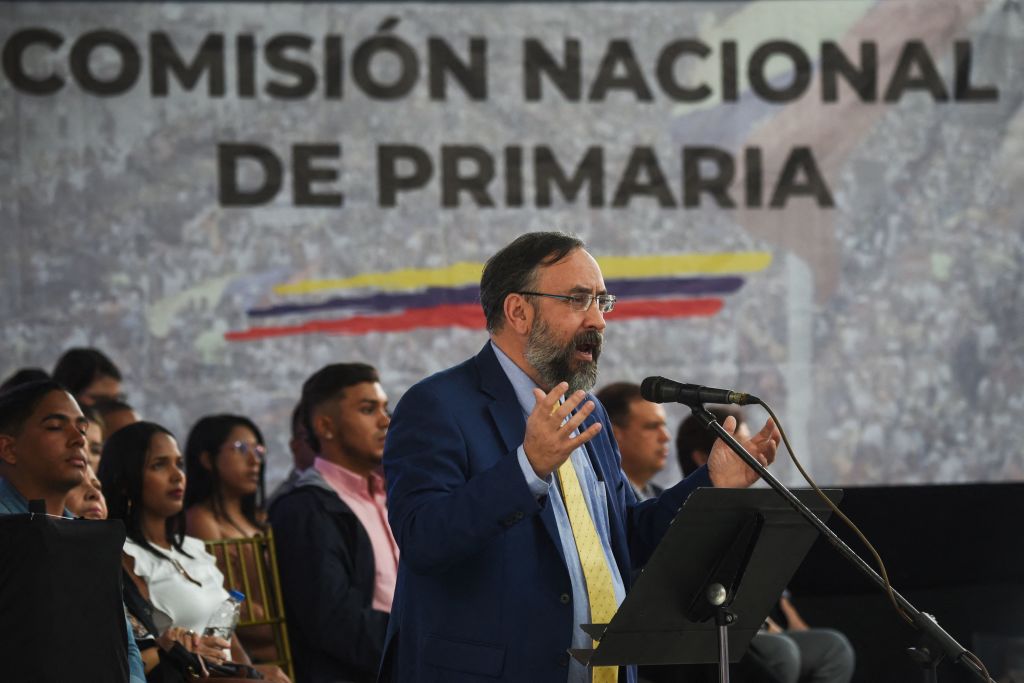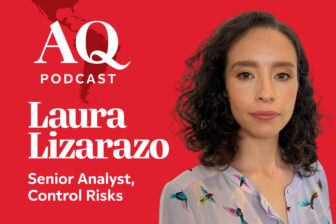Most articles on Venezuela hold that the government’s authoritarian streak will prevent a meaningful democratic opening during the 2024 elections. But the opposition’s lack of coordination and mobilization, both necessary to create change, may be just as important.
The opposition primary planned for October ahead of elections in 2024 is an important step, but it will not necessarily result in a united democratic front. Major obstacles will have to be overcome for a strong alliance to materialize.
The opposition’s organizational capacities have been seriously undermined by state repression. Meanwhile, the top-down approach led by Juan Guaidó’s interim government (2019-22) to oust President Nicolás Maduro through sanctions and “maximum pressure” failed to build grassroots traction. Specifically, it failed to build mutual trust and effective communication between opposition factions, durable links to civil society, or a narrative that could mobilize citizens across the ideological spectrum.
In fact, this high-stakes strategy might have made future engagement with voters more difficult. Citizens are not as apolitical as some suggest, but they have largely disconnected from politics as opposition politicians bicker with each other and fail to fulfill promises of ousting Maduro.
Why is the opposition so divided?
Building a coordinated front is easier said than done. As in democratic settings, opposition camps in authoritarian contexts are highly heterogeneous. Venezuela’s opposition parties vary in size, resources, leadership availability, ideology and commitment to democratic norms. Some are committed to pursuing institutional pathways and crafting electoral majorities, while others promote rallies, boycotts or coup attempts to fast-track change.
From 2009-16, opposition parties in Venezuela managed to address these tensions through the Democratic Unity Roundtable (MUD), a coalition with decision-making rules and conflict resolution mechanisms. But now, in the aftermath of their success in the legislative elections of 2015, the repression that followed, and the failure of the interim government, opposition parties are newly divided.
One camp favors a clean-cut end to the regime and an immediate confrontation with its corruption. The other camp supports a gradual process of democratization that it considers more realistic, promising reconciliation as well as ambitious democratizing reforms.
A national primary commission is trying to navigate this divide. But it remains to be seen whether all of the opposition will commit to the commission’s rules, which are set by the Plataforma Unitaria, a spin-off of the MUD. For example, primary participants must agree to respect a minimum joint program, abide by the outcome and campaign for the winner.
However, most candidates have already begun the polarizing game of blaming each other for past failures. This risks disenchanting voters and hurting participation, because it reinforces the impression that the eventual winner of the primary may impose his or her own vision instead of a collective agenda that represents the diversity of the opposition.
What’s next?
The government will—once again—attempt to “divide and conquer,” resorting to manipulation, libel, co-optation and repression to weaken and split the opposition vote. None of this will take anyone by surprise; chavismo has been using such tactics for years. The question is whether the democratic camp can align its interests to build a resilient alliance that will survive after the primary is over.
To assuage each other’s fears, build trust and craft long-lasting programmatic and strategic commitments, candidates and parties will have to deemphasize their individual and partisan agendas and negotiate a series of internal “foundational pacts” to restore democracy in Venezuela.
Through this process, leaders and their party structures could commit to democratic norms and basic platforms for any upcoming elections, be they presidential, legislative or regional. These commitments could help them bridge their differences and reach disaffected voters from both the government and opposition camps.
Chile’s Concertación (in power from 1990 to 2010) offers a promising model. Through formal and informal means, previously antagonistic elites were able to address their deeply rooted divisions to win and govern over four consecutive terms. The Concertación was successful beyond its first mandate in large part because opposition decision-makers committed to wide-ranging negotiated agreements.
It is not too late for the Venezuelan opposition to restructure its internal relationships. Yet any bargaining process among opposition elites is unlikely to occur unless they feel pressure—and urgency—to do so. A variety of domestic and international actors could incentivize coalition-building by creating equal access to material and non-material resources, facilitating spaces for cooperation with civil society groups and conditioning support on compliance with collectively designed rules.
Venezuelans will continue to migrate or disengage from politics due to the dire economic and humanitarian crisis. Helping a viable alternative emerge is therefore as important as denouncing repression and fighting for better electoral conditions. The 2024 presidential elections could represent a turning point. But this will depend largely on the choices made by the opposition’s candidates and parties in the coming months.
Subscribe to The Americas Quarterly Podcast on Apple, Spotify, Google and other platforms
—
Jiménez is a Marie Skłodowska-Curie Fellow at the University of Oxford. This article expresses only the views of the author.






